Author: rie imai
IC Bunko UK New Year Message 2023(和訳更新予定)
The period from birth to eight years old is one of remarkable brain development for children and represents a crucial window of opportunity for education. UNESCO World Conference Early Childhood Care and Education Tashkent November 2022
Happy New Year to you all!
As 2022 draws to a close, parents discuss the problems left by Covid Lockdown for them and wonder how the insecurity of changes in routine and environment affected their young child’s Mental Health (well -being). Little is written about Double (Bilingual) Children growing-up during that period and how they coped within their two different cultural communities.
Each Double Child is unique with their own reactions and stresses. Their brains are social, and to grow-up as a Whole Child, they need to socialise with other Japanese children and adults. Unlike Japanese School, where rules are set and learning is mostly through teacher instruction, Bunko Meetings offer each young child opportunities to socialise within the community as they take part in activities, which adults have prepared for them. It is through these enabling activities that young children find out how to relate to other children and adults and develop their personality; it is through these activities that adults can start off (serve) back and forth conversations that build in (scaffold) new language and intellectual content. Young children absorb and learn from these focused exchanges led by an older Japanese speaker.
There is no right or wrong in a Bunko community, but warm encouragement through which young children discover how to ‘fit in’ and develop their own face-to-face conversations with other Japanese mothers and children. Young children learn from copying role models.
Although the Bunko Meeting experience is short, learning can be extended by pre-preparation at home and consolidation afterwards by a shared-review of what took place.
Borrowing Bunko Picture Books allows children to take something of their Bunko experience home. Shared-reading books at home can lead to independent ‘reading’ – text or only pictures- at their own pace.
Mothers are not instructors, but enablers, who help young children use their self-learning skills to discover and learn more deeply as they repeat a known activity. Creating a safe, caring Bunko community experience is up to parents. We cannot judge children’s Whole Child Development by a formal test, but more by how confidently the child socialises and discusses with others – talk is said to be spoken thought.
How adults talk to a young child in Bunko develops their positive well-being, basic for any learning. Bunko offers a unique, special and important ‘feel-safe, feel-good’ experience for a young child. Bunko Graduates studying at University in Japan told me Bunko in London was their happiest experience.
Opal Dunn
IC Bunko UK New Year Message 2023
The period from birth to eight years old is one of remarkable brain development for children and represents a crucial window of opportunity for education. UNESCO World Conference Early Childhood Care and Education Tashkent November 2022
Happy New Year to you all!
As 2022 draws to a close, parents discuss the problems left by Covid Lockdown for them and wonder how the insecurity of changes in routine and environment affected their young child’s Mental Health (well -being). Little is written about Double (Bilingual) Children growing-up during that period and how they coped within their two different cultural communities.
Each Double Child is unique with their own reactions and stresses. Their brains are social, and to grow-up as a Whole Child, they need to socialise with other Japanese children and adults. Unlike Japanese School, where rules are set and learning is mostly through teacher instruction, Bunko Meetings offer each young child opportunities to socialise within the community as they take part in activities, which adults have prepared for them. It is through these enabling activities that young children find out how to relate to other children and adults and develop their personality; it is through these activities that adults can start off (serve) back and forth conversations that build in (scaffold) new language and intellectual content. Young children absorb and learn from these focused exchanges led by an older Japanese speaker.
There is no right or wrong in a Bunko community, but warm encouragement through which young children discover how to ‘fit in’ and develop their own face-to-face conversations with other Japanese mothers and children. Young children learn from copying role models.
Although the Bunko Meeting experience is short, learning can be extended by pre-preparation at home and consolidation afterwards by a shared-review of what took place.
Borrowing Bunko Picture Books allows children to take something of their Bunko experience home. Shared-reading books at home can lead to independent ‘reading’ – text or only pictures- at their own pace.
Mothers are not instructors, but enablers, who help young children use their self-learning skills to discover and learn more deeply as they repeat a known activity. Creating a safe, caring Bunko community experience is up to parents. We cannot judge children’s Whole Child Development by a formal test, but more by how confidently the child socialises and discusses with others – talk is said to be spoken thought.
How adults talk to a young child in Bunko develops their positive well-being, basic for any learning. Bunko offers a unique, special and important ‘feel-safe, feel-good’ experience for a young child. Bunko Graduates studying at University in Japan told me Bunko in London was their happiest experience.
Opal Dunn
伊藤忠記念財団
Itochu Memorial Foundation
The Great Britain Sasakawa Foundation
グレイトブリテン・ササカワ財団
大和日英基金
Daiwa Foundation Japan House
Japan Centre
ジャパンセンター
ミセス・ダン The British Council ELTons Outstanding Achievement Award 受賞!
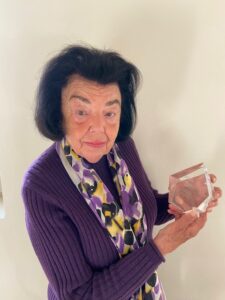 2020年10月15日、British Council ELTons Award 2020 の授賞式が行なわれ、ICBAの名誉会長であるミセス・オパール・ダンが、Outstanding Achievement Awardを受賞しました。この賞は、英語教育の形成に於いて世界の人々に影響を与えた貢献を表彰するもので、英語教育のオスカーともいわれています。
2020年10月15日、British Council ELTons Award 2020 の授賞式が行なわれ、ICBAの名誉会長であるミセス・オパール・ダンが、Outstanding Achievement Awardを受賞しました。この賞は、英語教育の形成に於いて世界の人々に影響を与えた貢献を表彰するもので、英語教育のオスカーともいわれています。
ミセス・ダンは絵本を使って言葉を教えることの先駆者で、自身が出版した絵本は様々な国で翻訳されました。また、バイリンガルの子どもたちが自分たちで2つ目の言葉を習得するための環境として、日本で英語の文庫を発案し実践しました。
ELTons Awardの選考委員は、言葉を学ぶ子どもと親や教師を豊かなアイデアでサポートし続けてきたミセス・ダンの功績を高く評価し、「多言語で育つ子ども達が世界中で増えている今、やっと時代はあなたに追いついてきた。あなたほど長く、深く子どもの言語教育に携わってきた人はいない」とコメントしました。
ミセス・ダンは授賞式のスピーチで、子どもたちは心地よい経験を通して自己学習することに触れながら、環境を整え、種を蒔くことが大人の役割であること、幼い頃に理屈ではなく自然に吸収するものこそが、生涯 心に残る大切なものであることを伝えました。そのスピーチの中で引用されたノーベル賞受賞作家イシグロカズオのことばが印象的です。‘Many of our deepest motives come not from adult logic of how things work in the world, but out of something that is frozen from early childhood‘
ミセス・ダンによって蒔かれた種はICBAの文庫としても成長し、現在も引き継がれています。Children First – 常に子どもたちを一番に考え、温かく本当の意味での教育を実践し続けてきたミセス・ダンとその功績に敬意を表し、この度の受賞に心からお祝い申し上げます。
Mrs Dunn received The British Council ELTons Outstanding Achievement Award!
 Mrs Opal Dunn, an honorary chairman of ICBA, received the Outstanding Achievement Award at the ceremony for the British Council ELTons Outstanding Achievement Award on 15th October 2020. The Award recognises and celebrates people who have made a lasting and extraordinary impact on English language teaching and learning. The Award is said to be equivalent to an Oscar in the English education.
Mrs Opal Dunn, an honorary chairman of ICBA, received the Outstanding Achievement Award at the ceremony for the British Council ELTons Outstanding Achievement Award on 15th October 2020. The Award recognises and celebrates people who have made a lasting and extraordinary impact on English language teaching and learning. The Award is said to be equivalent to an Oscar in the English education.
Mrs Dunn is a pioneer who developed the teaching language technique by using picture books. She also published some picture books which have been translated into various languages. She started the English language Bunko in Japan for those bilingual children who learn the second language.
The Award selection committee recognised and highly appreciated her continuous support for children, teachers and parents with her rich ideas for teaching and learning language. The Committee commented “There are now an increasing number of children in the world who grow up with multiple languages. Time has caught up with you. There is no one like you who has dedicated their life in children’s language education for so long.”
In her speech at the ceremony, she mentioned that it is important that children self-study through feel-good experience and that adult’s role is to prepare the right environment and sow the seeds. Things that children absorb naturally without any logic when they are young are important and bound for life. She quoted Kazuo Ishiguro’s words; “Many of our deepest motives come not from adult logic of how things work in the world, but out of something that is frozen from early childhood‘
The seeds sown by Mrs Dunn are evident and developed in the ICBA bunko and are still carried on. “Children First”. Mrs Dunn always put children first and practiced what she believed in in her support for teaching and learning languages. We would like to express our thanks and respect for her achievement. Congratulations on her winning the award.
スタディーデイ2020
ICBA UKでは、3月に東京で 外国にルーツを持つ子どもの言語習得を支援する保育、および継承語に関する研究をされている先生方をお迎えしてスタディーデイを行なう予定でしたが、コロナウィルスが急激に蔓延し深刻化したため、やむなくキャンセルいたしました。3月半ばから文庫も活動を停止し、その後、28日にはロックダウンに入りました。6月に入った今、徐々に規制は緩和されていますが、まだ不安が多い状況です。このロックダウンの間、実際に会うことはできない代わりに、オンラインで遠くの家族や友達と会うようになった方も多いと思います。それを利用して、ICBA UKは7月にスタディーデイを改めて計画中です。詳細は近日お知らせいたします。
Study Day 2020
ICBA UK planned a Study Day in March 2020, inviting three researchers from Tokyo. However, due to the rapid spread of coronavirus, we made the decision to postpone it. IC Bunko also stopped their activities from mid March and the lockdown was enforced on 28 March in the UK. Some lockdown restrictions have begun to be lifted from June, but the situation is still unsafe. Like IC Bunko, many people may be meeting with friends and family online during the current lockdown. Using this technology, we are now planning an online Study Day in July. More details will follow soon.
Bunko Visit Project Phase 1
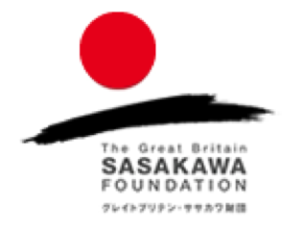 Bunko Visit Project Phase 1 started in June 2018 finished on 20 March 2020. We visited 10 Buno – Kurukuru Bunko (Derby), Wight Bunko (Isle of Wight), Kabutomushi Bunko (Liverpool), Aiuen Bunko (Chester), Akebono Bunko (Eastleigh), Zousan Bunko (Essex), Higashinomori Bunko (Chingford), Hifumiyo Bunko (Nottingham/Derby), N8 Bunko (North London) and Kasasagi Bunko (Newcastle).
Bunko Visit Project Phase 1 started in June 2018 finished on 20 March 2020. We visited 10 Buno – Kurukuru Bunko (Derby), Wight Bunko (Isle of Wight), Kabutomushi Bunko (Liverpool), Aiuen Bunko (Chester), Akebono Bunko (Eastleigh), Zousan Bunko (Essex), Higashinomori Bunko (Chingford), Hifumiyo Bunko (Nottingham/Derby), N8 Bunko (North London) and Kasasagi Bunko (Newcastle).
We sincerely appreciate The Great Britain Sasakawa Foundation for their support of this project.
第1期 文庫訪問プロジェクト 終了
 2018年6月に開始した第1期 文庫を訪問プロジェクトは2020年3月20日に終了しました。合計10文庫、くるくる文庫(ダービー)、ワイト文庫(ワイト島)、かぶとむし文庫(リバプール)、あいうえん文庫(チェスター)、あけぼの文庫(イーストレー)、ぞうさん文庫(エセックス)、東の森文庫(チンフォード)、ひふみよ文庫(ノッティンガム/ダービー)、エヌハチ文庫(北ロンドン)、かささぎ文庫(ニューカッスル)を訪問しました。
2018年6月に開始した第1期 文庫を訪問プロジェクトは2020年3月20日に終了しました。合計10文庫、くるくる文庫(ダービー)、ワイト文庫(ワイト島)、かぶとむし文庫(リバプール)、あいうえん文庫(チェスター)、あけぼの文庫(イーストレー)、ぞうさん文庫(エセックス)、東の森文庫(チンフォード)、ひふみよ文庫(ノッティンガム/ダービー)、エヌハチ文庫(北ロンドン)、かささぎ文庫(ニューカッスル)を訪問しました。
このプロジェクトを支援してくださったグレートブリテン ササカワ ファンデーション に心から感謝いたします。
Useful Videos
Video Archives
動画 お役立ち
2019年度 伊藤忠記念財団子ども文庫助成の受賞が決まりました
今年はICBA UK支部から は4文庫が応募し、あいうえん文庫、しらす文庫、ワイト文庫は「100冊助成」を、トテナム文庫は「子どもの本購入助成」30万円を受賞しました。
The Itochu Memorial Foundation Kodomo Bunko Promotion award for 2019
This year 4 Bunkos made applications from ICBA UK.
Tottenham Bunko was awarded Y300,000 for the category “promoting/assisting the purchase of books for children” and Aiuen Bunko, Shirasu Bunko and Wight Bunko were awarded for the category “one hundred children’s books”.
Nelson Bunko Kabutomushi Bunko, Ms Akie Maruyama, a representative of ICBA Head Office in Tokyo were granted The Itochu Memorial Foundation Kodomo Bunko Promotion award!
The Itochu Memorial Foundation Kodomo Bunko Promotion 2018 award ceremony was held on 1st March 2019.
This year 78 bunko/organisations out of 138 applications were granted the awards. 12 overseas applications were made and 9 were granted the awards. From ICBA, two bunko from the UK made applications. Nelson Bunko was awarded Y300,000 for the category “promoting/assisting the purchase of books for children” and Kabutomushi Bunko was awarded for the category “one hundred children’s books”.
Three individuals were given an award for distinguished service, specifically running and promoting children’s bunko activities over a long time (over 20 years). Ms Akie Maruyama of ICBA Tokyo Head Office was given an award for promoting International Bunko.
伊藤忠記念財団子ども文庫助成 贈呈式 – ネルソン文庫、かぶとむし文庫、および東京本部の丸山明栄代表が受賞しました!
2018年度 伊藤忠記念財団子ども文庫助成贈呈式が3月1日に 行われました。
今年は助成応募件数138件の中から78の文庫・団体が受賞。そのうち海外からの応募は12件、助成件数は9件でした。ICBAから の応募はUK支部からの2件で、ネルソン文庫が「子どもの本購入助成」30万円を、 かぶとむし文庫が「100冊助成」を受賞しました。
また、子ども文庫を長年に亘り(20年以上)運営し、子どもの読書活動に貢献されてきた個人に贈られる功労賞は、今年度は3名が受賞。ICBAからは、東京本部の丸山明栄代表が 国際文庫貢献賞を受賞しました。
Japanese Ambassador’s Commendation to Ms. Yoko Morishima
On 24 November 2017, the ceremony for the bestowal of the Ambassador’s Commendation to Ms. Yoko Morishima, ICBA UK Branch Manager, was held at The Embassy of Japan. Her long term contribution to the Japanese community in London was highly appraised.
We are so delighted and proud that her 40 year volunteer work, devoted to Double Children was appreciated.
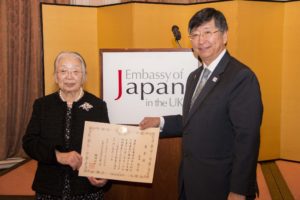
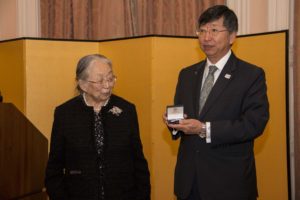
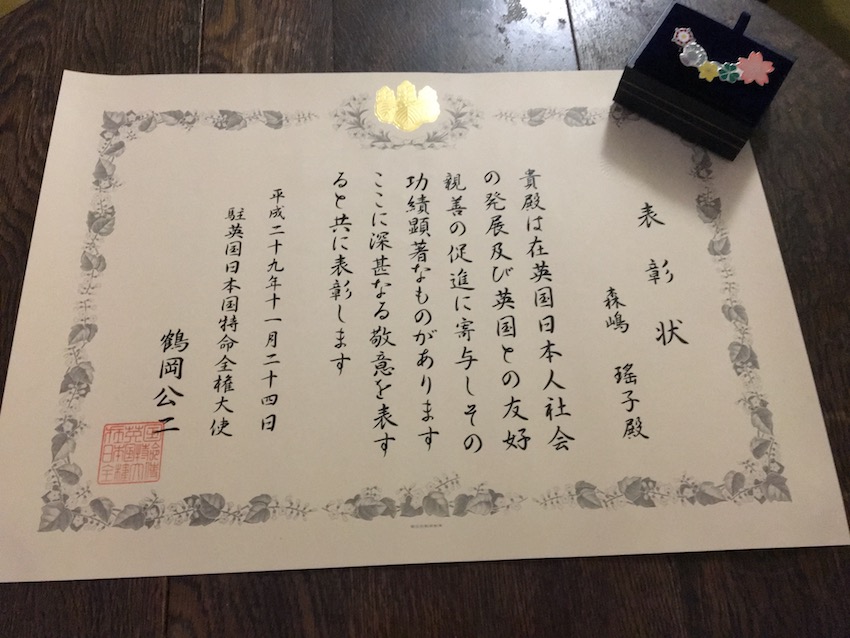

森嶋さんの在外公館長表彰授与式
本の紹介テストページ
図書係よりおすすめの本です。
Aiuen
We are based in Merseyside and Chester area. We meet every week at one of our member’s house. The main activities include crafts, reading books, singing songs and Kamishibai. Our aim is to create a fun environment for using Japanese language, so that using Japanese becomes a part of children’s everyday life.
あいうえん
日本語を使うことが自然に日常生活の一部となるように頻度を上げて集まっています。工作、読み聞かせ、歌、紙芝居を通じて楽しい日本語の環境を作っています。
Wight
Our main activities include reading picture books, showing Kamishibai and introducing traditional and seasonal events and their associated games, through which we hope children get familiar with the Japanese language. We aim to create a fun place for our children.
ワイト
紙芝居や絵本の読み聞かせ、日本の季節や行事にちなんだ遊びを通して日本語に親しみ、みんなで楽しく活動できる文庫を目指しています。
エヌハチ
2020年1月に始まったばかりのできたてホヤホヤの文庫です。
モットーは「日本語でみんなとわいわい楽しく過ごそう」。赤ちゃん連れでも気兼ねせずに参加できて、他の親御さんたちといろいろ相談できる… こどもたちが日本語もおもしろいと思ってくれる… そんな会がクラウチエンドで長く続くといいなと思います。
N8
N8 Bunko (Enu hachi bunko) is a brand new bunko. We started in January 2020. At our commemorable first meeting, we sang songs, read books and Kamishibai. We also talked about Setsubun (a day to celebrate the coming of spring) and made mice in origami, which is this year’s Japanese zodiac.
The children were all strangers to one another at first, but in the end they all enjoyed playing together and became friends. We hope that they will grow closer each time they meet.
Our motto is “all having fun in Japanese”. We welcome members with babies. We hope that our bunko becomes a place for parents to come and meet with other parents and where children find Japanese language fun as well. We hope to continue our bunko for a long time at Crouch End.
種まき
季節の行事、工作、読み聞かせ、手遊び歌、ラジオ体操、文字、クッキングなど。子どもたちがやりたい事を聞きながら取り入れて、楽しく日本語や日本の文化に触れていけるよう環境を作っていきたいと思います。
Tanemaki
Our activities include introducing children traditional events and crafts, reading books, singing finger play songs, radio taiso (exercise), Japanese characters and cooking etc. We try to organise something that our children are interested in doing. We hope to create an enjoyable environment where our children are exposed to Japanese language and culture.
ドラゴン
2023年に新設したばかりの北ウェールズにある小規模な文庫です。
紙芝居、本の読み聞かせを主軸とし、日本語の読み書きができるためのサポートもしていきたいと考えています。具体的な内容としては、日本の童謡、かるた遊び、クラフト、外での遊び(だるまさんが転んだ等)、遠足やキャンプ等のアウトドア、ラジオ体操等のほか、日本の季節的行事(書初め、節分、夏(秋)祭り、こどもの日、十五夜、クリスマス等)を体験しながら、日本文化に慣れ親しむための企画を実施していこうと考えています。
お近くにお住まいの方で興味があるご家庭は、一度体験見学などもお気軽にご相談ください。
Dragon
We are a small kids book club located in North Wales that has just established in 2023.
We focus on picture-story shows and reading Japanese kid’s books to kids, and also provide support for children to be able to read and write Japanese.
Main activities we are planning now is Japanese nursery rhymes, playing KARUTA(card game), crafts, outdoor game/activities.(e.g. “Daruma-san ga koronda”, Excursions, Camping, Radio calisthenics, etc.).
And also, Japanese seasonal events such as Japanese calligraphy, “Setsubun”,Children’s Day,”Matsuri” in Summer/Fall, “Jugoya”, Christmas are planned to support children interact with Japanese culture.
If you are interested in our book club and live near area, please feel free to contact us for a trial.
A message from Mrs Dunn
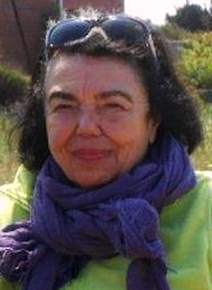
2020年パンデミックのなかでのIC文庫の子どもたち
今は全ての人にとって、特に子どもたちにとってむずかしいときです。子どもたちの世界は今までと全く変わり、家の中にも外にも普段の生活はなくなってしまいました。「ロックダウン」で家にいることを強いられ、そこには普段外で働いている親がいて、毎日の日課や家族との関係も変わっています。突然の休校で、家で家族と一緒にいるときとは別の自分のアイデンティティで行動する学校という場所を失って、家の外での社会生活もなくなってしまいました。学校では、家にいる時とは違う自分で同い年の子どもたちと遊び、時にはリスクも恐れません。文庫活動もできなくなり、家族以外の日本人と交わったり、日本人としてのアイデンティティを感じたりする機会もなくなりました。ですから、大人の視点ではなく、子どもの視点に立って、今の子どもの生活をみるように努めましょう。子どもたちは今の状況をどのように感じているでしょうか。
もうすぐ6月です。何か月かに及んだロックダウン生活の後、子どもたちの世界はまた徐々に変わり始めています。学校の再開、フットボール等のスポーツのテレビ観戦の再開。子どもたちは学校に戻って友達とどのように「ソーシャルディスタンス」を守りながら遊ぶのか、親は子どもたちに言って聞かせる必要があります。日本で日本語だけで暮らす子どもたちと違い、英語で話す学校に通うIC文庫の子どもたちにとっては、学校のアクティビティや他の子どもたちとの交流さえもがチャレンジです。日本人の子どもの中には、休み時間に校庭に行くことにさえ臆病になってしまうことがあります。
IC文庫の活動は、子どもたちがダブルアイデンティティを持つことを「feel good」、よいことだと感じられる手助けをしています。アクティビティを一緒にすることで、そこに「自分の場所をみつけ」、自分がどのように感じ、また、その感情をどのようにコントロールするか等を学ぶ機会になっています。家庭という安心できる空間でも、日本人の親は同じようなアクティビティやおしゃべりを通して、子どもがまた自信をもって外に出かけられるようにしましょう。
一日の決まった時間に「You and Me Times(あなたと私の時間)」を設け、会話のキャッチボールができるアクティビティを一緒にするのはいかがでしょう。今現在、あるいは将来の経験について子どもと向き合って話すことで、大人は自分の言うことを聞いてくれている、どのように感じているか心配してくれていると子どもは感じとるでしょう。「会話のキャッチボール」を少し進め、どう思うの?とか、どうしたの?といった質問をなにげなくしてみます。おしゃべりが予想しない方向に進むと、発見があったり、子どもの欲求不満さえみつかるかもしれません。どうしてできないの?どうしてしなければならないの? 幼い子どもはテレビのニュースや iPhone、大人の会話から大人の想像以上のことをキャッチしています。パンデミック(コロナ禍)についてどのように感じているかを話し合うことで、学校が再開して先生の話を聞くとき、または公園で他の子どもたちと遊ぶときのために、子どもなりの心の準備をさせましょう。
幼い子どもの心配事や感情を理解することは大切です。きちんと説明することで子どもの心を落ち着かせ、どうして自分はこのように感じているか、子どもが理解することを助けられます。人間が皆、基本的な感情を同じように持っているということを知るのは、一緒にアクティビティーを行なう上で、また一緒に何かを学ぶ上で大事です。今日、私は「feel good」と感じている。あるいは悲しい。あの子はどんな気持ちだと思う?
幼い子どもが感情を理解するには、まず、4つの基本的な感情(ハッピー、悲しい、怖い、腹が立つ)を子どもが確実に理解し、英語と日本語で言えることです。絵文字の表情を使っておしゃべりやアクティビティをしたり、「You and Me Times」で表情を一つずつ作ってみましょう。そして、その表情について会話を考えてみましょう。例えば、最後に悲しく感じたのはいつだったかな?あの子が怒っているってどうしてわかるのかな?あの子が元気になってきたってどうしてわかったの?
この4つの基本的な感情をしっかり理解し、言葉で表現できるようになったら、今度は、他の絵文字の表情を一つずつ見て行きましょう。好き嫌いについても話し合いましょう。これは食べ物や服の好き嫌いだけではなく、学校で会う人の好き嫌いでもいいです。子どもの気持ちに驚くかもしれません。
子どもが自分の感情を理解し、人の感情を理解する手助けは、共感や感情移入できるように導く大切な一歩です。子どもは同じアクティビティを何度も繰り返してやりたがるので時間はかかるかもしれません。なぜなら、子どもは最初に説明したことを膨らませたり、戻って考え直したりしたいからですが、振り返ることによって本当の学習ができると言われています。
そして、子どもが次の段階に進む準備ができたと大人が感じたら、ビスケット作りや、雑誌の切り抜き写真を使ったはり絵のようなミニプロジェクトを始めましょう。ミニプロジェクトでも会話をする「シーン設定」を考え、この会話の中に少しずついろんな言葉を付け加えていくことにより、子どもの言葉の使い方や語彙を増やします。子どもにとって興味深いアクティビティの中で聞いたり使ったりした新しい語彙は、テストで言葉を一つ一つ覚えるよりも吸収され、記憶に残ります。
他にも楽しいミニプロジェクトがあります。子ども自身のパンデミックの思い出帳を作ってみましょう。(A4の紙を二つに折って、厚めの紙で表紙を作ります)題は「2020年のパンデミックと私/僕」とし、折ったページに絵を描きます。字がまだ十分に書けない幼い子どもには「お話」してもらって、それを書いてあげましょう。完成したら一緒に読みながら、言葉を一つずつ追います。(この思い出帳の作成は感情を表すことで、書き方の勉強ではありません。)
「You and Me Times」がときに英語だけになってしまうと、親は日本語を忘れてしまうのではないかと心配になります。でも、どちらの言語を使っても、やる気があって、「feel good」、ポジティブに感じていれば子どもは学習し、学んだことをひとつの言語から他の言語にうまく言い換えることができます。もちろん、英語で経験したことをお母さんやお父さんが日本語で繰り返してあげれば、子どもにとってはその方が簡単かもしれません。一緒にアクティビティをやって、それについて話し、そこから広がることは学習を共有するだけではなく、気持ちの安定にもなります。アクティビティを一緒にしながら説明するお母さんやお父さんの声のトーンや、これを「どうやって?」とつぶやきながら考える様子なども、子どもが考えを吸収し、新しい言葉を自然に覚えるいい機会になります。
しかし、一緒にするアクティビティは、ポジティブなものでないと子どもには身につきません。会話に「それはダメ」、「それはしない」といった否定的な言葉が多すぎないか、言葉の間違いをその都度正していないか、注意しましょう。子どもがやる気を失ってしまいます。お母さんやお父さんのいつものおふざけ言葉で笑わせたり、急に短いライムや歌、冗談などを使ったりしてみるのもいいでしょう。こうした思いがけない言葉は、おしゃべりをもっと楽しくし、ネガティブなムードをポジティブにさえ変えます。
子どもと一緒にするアクティビティは、大人と子ども、両者がどう感じるかが大事です。感情は私たち全てが自然に持っているものです。「feel good」、ポジティブな気持ちになることは、話すことや学ぶこと全ての基本で、どんな会話にも価値があります。子どもとのアクティビティは生涯残る親子の絆となるでしょう。
2020年5月29日オーパル・ダン


